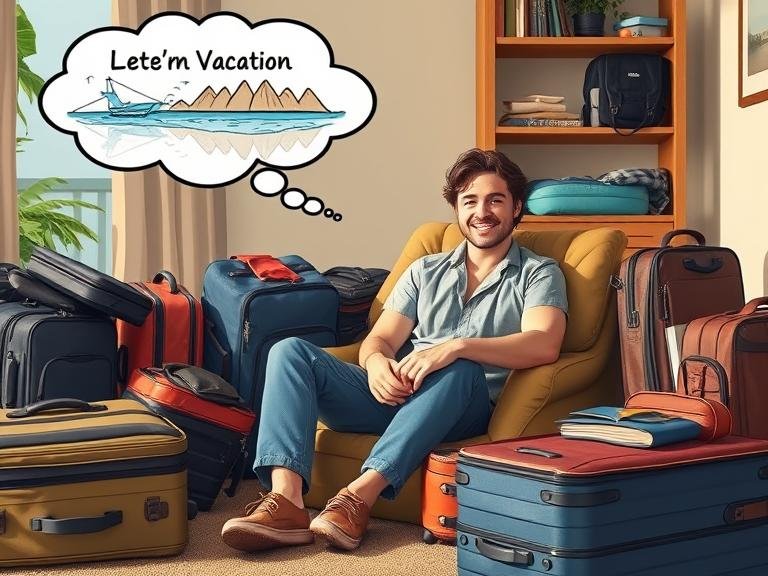Vacations are supposed to be the ultimate form of relaxation. They promise escape from everyday stress, new experiences, and a chance to recharge. Yet, many people return home from their much-anticipated trips feeling drained rather than refreshed. This surprising reality has given rise to the concept of a “vacation from vacation.”
But what does it mean, why do we feel the need for it, and how can we manage our time off in a way that leaves us truly rejuvenated? Let’s dive into the psychology, practical examples, and solutions behind this modern travel paradox.
Table of Contents
What Does “Vacation from Vacation” Mean?
The phrase “vacation from vacation” refers to the sense of exhaustion people feel after returning from what was meant to be a restful getaway. Instead of coming back with renewed energy, many travelers find themselves overwhelmed by fatigue, unpacked suitcases, piled-up chores, or even post-trip stress.
In simple terms, it describes the feeling that your vacation created more work for you than it relieved. This often leads people to crave extra downtime once they return home—essentially, another vacation to recover from the first.
Why Do Vacations Sometimes Leave Us Tired?
Vacations are enjoyable, but they can also disrupt normal routines and put unexpected pressure on the body and mind. Here are some of the most common reasons people feel like they need a vacation from their vacation:
1. Over-scheduling Activities
Many travelers pack their itineraries with tours, sightseeing, and nonstop activities. While exciting, this constant rush leaves little time to rest. By the end of the trip, the body feels worn out rather than refreshed.
2. Travel Stress
Airports, delayed flights, navigating unfamiliar cities, or dealing with traffic all add hidden stress. Instead of unwinding, people may find themselves in high-alert problem-solving mode.
3. Lack of Sleep
Vacations often involve late nights, early mornings, or uncomfortable sleep environments like hotel beds or crowded accommodations. Sleep deprivation is one of the leading causes of post-vacation fatigue.
4. Physical Strain
Walking long distances, carrying luggage, hiking, or engaging in water sports can physically wear down the body. While enjoyable, these activities can be as demanding as a workout routine.
5. Social Exhaustion
Group vacations or family trips often require constant interaction. For introverts or people who value quiet time, this lack of solitude can be mentally draining.
6. Post-Trip Responsibilities
Returning to piled-up emails, unpaid bills, or housework can feel overwhelming. The mental shift from “vacation mode” to “responsibility mode” can create a crash in energy.
The Psychology Behind Needing a Vacation from Vacation
On a deeper level, the need for recovery after travel can be explained by psychology. Humans thrive on routine and balance. Vacations disrupt both. Even positive disruptions, like exciting adventures, require the brain to process constant changes.
This constant stimulation, known as cognitive load, tires the mind just as much as the body. The brain craves downtime to process experiences, organize memories, and regain stability.
Furthermore, travel can sometimes come with hidden pressure:
- The pressure to “make the most” of every moment.
- The desire to capture perfect photos or memories.
- The fear of missing out (FOMO).
Instead of being stress-free, vacations can become performance-oriented experiences.
How to Avoid Needing a Vacation from Vacation
The good news is that with a bit of planning and mindfulness, you can return from your travels feeling genuinely rested. Here are practical strategies:
1. Build in Buffer Days
Instead of going straight from a trip back to work, try to leave one or two unscheduled days at home. Use this time to unpack, rest, and ease back into normal life.
2. Plan Less, Experience More
Avoid over-scheduling your itinerary. Leave space for spontaneous activities or simply doing nothing. Sometimes sitting by the beach or enjoying a local café is more rejuvenating than rushing through museums.
3. Prioritize Sleep
Treat sleep as part of your vacation plan. Choose accommodations that are quiet and comfortable, and don’t be afraid to skip a late-night outing if your body needs rest.
4. Balance Adventure and Relaxation
Mix high-energy activities with restful moments. For example, if you spend one day hiking, follow it with a slower day by the pool or at a spa.
5. Unplug from Digital Pressure
While taking photos is fun, avoid turning your trip into a social media project. Limit your screen time and focus on being present.
6. Travel at Your Own Pace
Don’t compare your trip to others. A meaningful vacation is one that aligns with your personal energy levels and preferences, not what travel influencers suggest.
Benefits of Taking a “Vacation from Vacation”
Sometimes, despite our best efforts, we still feel drained after a trip. Taking a mini break after your vacation can offer surprising benefits:
- Improved Transition: Extra rest days help you shift from travel mode to daily life smoothly.
- Reduced Stress: You can tackle unpacking, chores, and emails gradually without feeling rushed.
- Better Reflection: A quiet pause allows you to process memories and truly appreciate your travel experiences.
- Restored Energy: You return to work or school more focused and ready to perform.
Think of it as the “cool-down stretch” after an intense workout.
Real-Life Examples of Needing a Vacation from Vacation
- The Family Disney Trip: Parents often describe theme park vacations as magical but exhausting. Long lines, heat, and walking all day leave them craving a quiet day at home afterward.
- International Adventures: Jet lag combined with multiple flights can leave travelers needing several recovery days before feeling normal again.
- Group Road Trips: Spending every moment in a car or with a group can be fun, but introverts often feel socially drained and need downtime afterward.
Conclusion
Vacations are vital for relaxation, exploration, and joy, but they can also be paradoxically exhausting. The concept of a “vacation from vacation” is becoming more common in today’s fast-paced travel culture.
By planning wisely, balancing activity with rest, and leaving buffer days after travel, you can minimize post-vacation fatigue. And if you still find yourself needing that extra pause afterward, it’s not a failure—it’s simply your mind and body reminding you that true rest often comes in layers.
FAQs About Vacation from Vacation
1. Why do I feel so tired after a vacation?
Because vacations often involve disrupted sleep, heavy activity, and travel stress, many people return home physically and mentally drained.
2. How long does it take to recover from a vacation?
It depends on the trip, but most people need 1–3 days to feel fully rested again.
3. Should I always plan buffer days after a vacation?
Yes, if possible. Even one day at home before returning to work can make a big difference in recovery.
4. Is it normal to feel anxious after coming back from a trip?
Yes. The sudden shift from “vacation mode” to daily responsibilities can trigger mild post-travel anxiety.
5. How can I avoid needing a vacation from my vacation?
Plan a balanced itinerary, prioritize sleep, travel at a comfortable pace, and allow downtime both during and after the trip.

